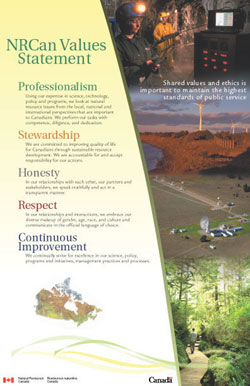ARCHIVED - Appendix 3: NRCan Initiatives to Internalize Corporate Social Responsibility
Information Archived on the Web
Information identified as archived on the Web is for reference, research or recordkeeping purposes. It has not been altered or updated after the date of archiving. Web pages that are archived on the Web are not subject to the Government of Canada Web Standards. As per the Communications Policy of the Government of Canada, you can request alternate formats. Please "contact us" to request a format other than those available.
Sustainable Development Strategy
Moving Forward
Corporate Social Responsibility (CSR) describes the commitment by an organization to meet stakeholder expectations on economic, environmental and social performance. It is often seen as the business contribution to sustainable development. Within NRCan, activities under the Modern Comptrollership Initiative highlight the Department’s efforts to lead by example on CSR.
Values and Ethics at NRCan
Following on the Auditor General’s 1995 Report, and A Strong Foundation, Report of the task force on public service values and ethics (The Tait Report, 1996), which identified the need for greater government-wide emphasis on values and ethics, NRCan began work on a Department-wide values and ethics initiative. The aim of the initiative is to enable better decision-making at all levels within the Department, and encourage employees to make more consistent choices based on a shared understanding of values.
NRCan’s objective in initiating a dialogue with employees on values and ethics issues was to develop a sustainable values and ethics culture that meets governmental and stakeholder expectations for NRCan. The process of engaging employees in an inclusive discussion helps to promote social awareness and responsibility within the organization.

Throughout 2002, groups of NRCan employees responded to the invitation to take part in workshop sessions to consider the next steps in renewing values and ethics within the Department. Dialogue sessions held at the Ottawa headquarters and all NRCan regional offices encouraged staff to contribute to the development of a renewed values statement. The revised values statement, focussing on professionalism, stewardship, honesty, respect and continuous improvement, was launched in June 2003, during National Public Service Week.
The Treasury Board released a new Values and Ethics Code for the Public Service of Canada, which came into effect on September 1, 2003. The Code sets out the values by which public servants should be guided in their work and professional conduct, including updated conflict of interest and post-employment measures. NRCan developed its own departmental values and ethics framework which is aligned with the Treasury Board Code.
Modern Comptrollership Initiative
NRCan’s work on values and ethics is part of the larger Modern Comptrollership Initiative. Modern comptrollership is a management philosophy that promotes delegation of accountability to the right level for effective program delivery and with the appropriate controls in place to effectively manage risk. Within this context, it is about using sound management practices to make better program and resource decisions. Shared values and ethics is one of the four pillars of this philosophy; the other three are integrated performance information, mature risk management, and accountability and stewardship.
The need for improved services to Canadians and fiscal restraint has resulted in important changes in the federal public service. Greater emphasis is being placed on exploring new ways of working, including forming partnerships with stakeholders to deliver effective, affordable programs and services. Modern comptrollership is one of the key initiatives supporting that transformation.
As a pilot department for Treasury Board-supported modern comptrollership initiative, NRCan was expected to implement modern management practices into our organization within five years. During this time, the Department has become a government leader in areas such as human resources and finance. We have made significant progress and we will continue in our efforts to become a better managed, more innovative department.
The ultimate aim of this initiative is to improve NRCan’s ability to advance the Government of Canada’s commitment to ensuring the quality of life of Canadians and building the Canada we want, for ourselves and for future generations.
Web links:
- NRCan Financial Management Branch site
- Treasury Board Secretariat Modern Comptrollership site
- Treasury Board Secretariat Office of Values and Ethics
Page details
- Date modified:


